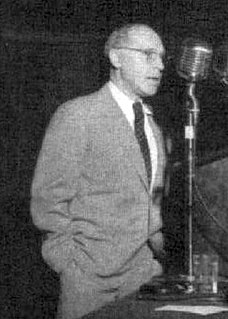A Quote by Henry David Thoreau
Books are the treasured wealth of the world and the fit inheritance of generations and nations. Books, the oldest and the best, stand naturally and rightfully on the shelves of every cottage. They have no cause of their own to plead, but while they enlighten and sustain the reader his common sense will not refuse them. Their authors are a natural and irresistible aristocracy in every society, and, more than kings or emperors, exert an influence on mankind.
Quote Topics
Aristocracy
Authors
Best
Books
Cause
Common
Common Sense
Cottage
Enlighten
Every
Exert
Fit
Generations
His
Influence
Inheritance
Irresistible
Kings
Mankind
More
Nations
Natural
Naturally
Oldest
Own
Plead
Reader
Refuse
Rightfully
Sense
Shelves
Society
Stand
Sustain
Than
Them
Treasured
Wealth
While
Will
World
Related Quotes
One day I would have all the books in the world, shelves and shelves of them. I would live my life in a tower of books. I would read all day long and eat peaches. And if any young knights in armor dared to come calling on their white chargers and plead with me to let down my hair, I would pelt them with peach pits until they went home.
Every writer owes something to a particular tradition he/she grew up in. But no serious writer - other than the militantly nationalist ones - would reduce his/her domain of influence to a single tradition. Furthermore, historical breaks are so common and large in Europe that there are ruptures in every tradition which then connect the same generations across national borders. Younger Eastern European writers, for instance, have more in common with other writers of the same age in Europe, than with the previous, communist-era generations in their own countries.
The Librarian considered matters for a while. So…a dwarf and a troll. He preferred both species to humans. For one thing, neither of them were great readers. The Librarian was, of course, very much in favor of reading in general, but readers in particular got on his nerves. There was something, well, sacrilegious about the way they kept taking books off the shelves and wearing out the words by reading them. He liked people who loved and respected books, and the best way to do that, in the Librarian’s opinion, was to leave them on the shelves where Nature intended them to be.
There's a room in my house where my stereo, records, CDs, and books are housed. I spend a lot of time in that room, sitting in my chair beside the fireplace, reading and listening to music. Sometimes I just stand before the shelves and look at my books, because every single one of them means something to me.
Women are books, and men the readers be, Who sometimes in those books erratas see; Yet oft the reader's raptured with each line, Fair print and paper, fraught with sense divine; Tho' some, neglectful, seldom care to read, And faithful wives no more than bibles heed. Are women books? says Hodge, then would mine were An Almanack, to change her every year.
Book lovers are thought by unbookish people to be gentle and unworldly, and perhaps a few of them are so. But there are others who will lie and scheme and steal to get books as wildly and unconscionably as the dope-taker in pursuit of his drug. They may not want the books to read immediately, or at all; they want them to possess, to range on their shelves, to have at command. They want books as a Turk is thought to want concubines - not to be hastily deflowered, but to be kept at their master's call, and enjoyed more often in thought than in reality.
As science is more and more subject to grave misuse as well as to use for human benefit it has also become the scientist's responsibility to become aware of the social relations and applications of his subject, and to exert his influence in such a direction as will result in the best applications of the findings in his own and related fields. Thus he must help in educating the public, in the broad sense, and this means first educating himself, not only in science but in regard to the great issues confronting mankind today.
His books were part of him. Each year of his life, it seemed, his books became more and more a part of him. This room, thirty by twenty feet, and the walls of shelves filled with books, had for him the murmuring of many voices. In the books of Herodotus, Tacitus, Rabelais, Thomas Browne, John Milton, and scores of others, he had found men of face and voice more real to him than many a man he had met for a smoke and a talk.
No man, however enslaved to his appetites, or hurried by his passions, can, while he preserves his intellects unimpaired, please himself with promoting the corruption of others. He whose merit has enlarged his influence would surely wish to exert it for the benefit of mankind. Yet such will be the effect of his reputation, while he suffers himself to indulge in any favourite fault, that they who have no hope to reach his excellence will catch at his failings, and his virtues will be cited to justify the copiers of his vices.
It's great that there are so many different kinds of books for kids and adults to choose from. I think an eclectic reader is the best kind of reader to be, which would be why I was always so satisfied to hear that kids read the Baby-Sitters Club books and then went on and discovered other authors and other genres.
The crown and glory of life is character. It is the noblest possession of a man, constituting a rank in itself, and an estate in the general good-will; dignifying every station, and exalting every position in society. It exercises a greater power than wealth, and secures all the honor without the jealousies of fame. It carries with it an influence which always tell; for it is the result of proved honor, rectitude, and consistency-qualities which, perhaps more than any other, command the general confidence and respect of mankind.

































